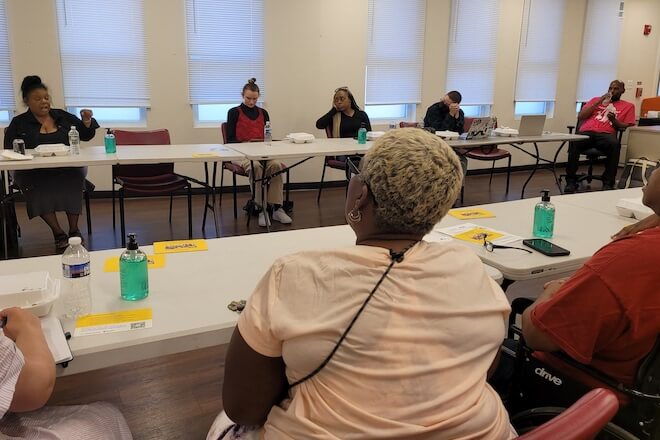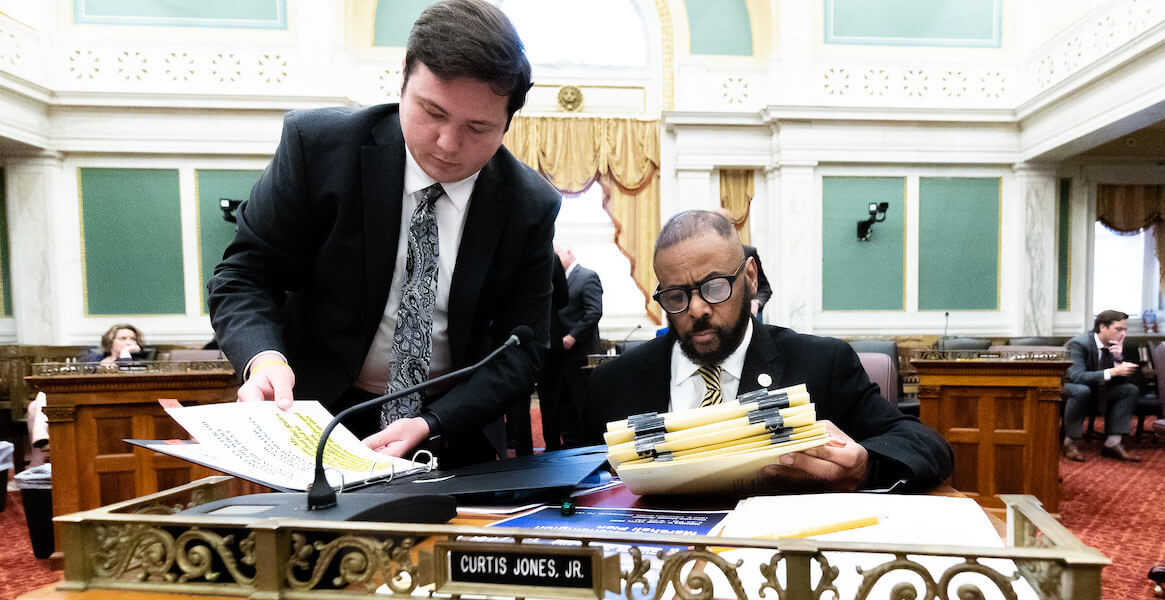Chicago resident Grace Del Vecchio has sat in on enough community development commission meetings to know how they go. A journalist and community activist who studied urban planning, Del Vecchio would watch as developers pulled out maps and construction plans, using terms like “lifestyle hub,” while residents raised concerns about affordable housing.
During these meetings, Del Vecchio, who’s originally from Philly, didn’t just develop a firm belief in residents’ “right to say what happens in their community, what’s built in their community, and who comes into it.” She also developed a side hustle she’s turning into a career.
Del Vecchio is part of Documenters, a network of individuals paid to attend and record public hearings. The idea behind Documenters: Give people who can’t make it to meetings a complete log of what happens there, and you’ll give them an opportunity to have a say in their communities.
“There’s so many barriers to going [to a public meeting].” — Julie Christie, director of data and special projects for Resolve Philly
In 2016, City Bureau in Chicago launched Documenters to increase transparency in local government and fill gaps left by vacancies in newsrooms. Since that time, Documenters has expanded to nine cities across the country. In April, the nonprofit Resolve Philly launched the program’s newest chapter, right here in Philadelphia.
The challenge of covering public meetings
Resolve Philly joined Documenters as part of its Shake the Table initiative, which aims to hold public officials accountable to underrepresented Philadelphians. As the team brainstormed potential projects, public meetings kept coming up in their conversations.
The City of Philadelphia holds approximately 50 public meetings per month. In these meetings, decisions are made on issues ranging from public safety to zoning permits and variances, and residents can voice concerns about prospective City policies or relay their support or opposition for building development projects in their neighborhoods.
Despite the real impact these meetings can have on the lives of Philadelphians, they can be difficult to attend. Daytime meetings exclude people who work 9-to-5s. Evening meetings make it harder for parents of young children or other caregivers. Then there’s the issue of getting there, and getting inside.
In the past, journalists covered these kinds of events. But with newsrooms shrinking both locally and across the country, many news organizations don’t have the resources to send reporters to every meeting.
“There’s so many barriers to going [to a public meeting],” says Julie Christie, director of data and special projects for Resolve Philly. “If it’s not in a physically accessible building, like if there’s stairs and you can’t take stairs, or the time of day that these meetings happen … A lot of the time there’s the issue of being notified about when a meeting is happening.”
What if, the Resolve Philly team thought, Shake the Table could help more people engage with public meetings by removing the barrier of physical attendance? What if one person who attended the meeting took notes, so others could read the summaries … and take action?
The team kicked around a few ideas for how they could create something like this. Then they realized they were essentially trying to replicate what already existed in Documenters.
The history of Documenters
Documenters trains and pays ordinary citizens to cover public meetings. Inspired by a Smart Chicago Collaborative program created to cover a two-day conference in 2014, Documenters began as a way to cover Chicago’s Police Accountability Task Force’s public hearings and lengthy (and wonky) reports after Chicago police officer Jason Van Dyke shot and killed 17-year-old Laquan McDonald.
Chicago’s City Bureau trained Documenters, dispatched them to take and publish notes from the hearings. Documenters also learned to annotate their reports to provide historical context and other information they thought would be helpful to general readers. They are also paid.
Today, the program has trained 2,000 people, covered more than 5,700 assignments in its various locations — and paid out more than $550,000 to its workers.
During this process, City Bureau discovered something amazing. “Community members were interested in participating in the reporting process,” says Max Resnik, Documenters’ network manager in Chicago. So, they expanded Documenters, who, he adds, “range in age from high school all the way up to retirees,” to cover other meetings in the city, including those about the development of the Obama Library.
Soon, other cities noticed — and wanted in. Documenters’ Detroit chapter launched in 2018. Cleveland followed in 2020. Every city enrolled shares one website and identical training materials, so it’s easy for a new city to start a chapter.
Today, the program has trained 2,000 people, covered more than 5,700 assignments in its various locations — and paid out more than $550,000 to its workers.
Ideas we are stealing: Philly Documenters
Since Resolve Philly announced the program in April, 244 people have filled out their online interest form. Of those 244, 34 are eligible to document public meetings.
Documenters trainings have taken place in-person and virtually, once a month. Each two-hour session covers website navigation, the assignment process, what to include in notes, and participants’ legal rights at public meetings. Christie describes the training as “journalism 101.” She says, “We’re preparing people so that they can feel really confident going into the average meeting.”
Once a training session is completed, (Yes! Just one!), a Documenter receive emails about assignments and can apply for them. Documenters earn $17 an hour and a minimum of $60 per assignment. Grants from the Scattergood Foundation and the Lenfest Institutes’ Every Voice, Every Vote fund the program.

Locally, our Documenters are a ways from attending all 50 of the city’s monthly public meetings. As Resolve Philly recruits and trains new participants, they’re focused on City Council, the Streets Department, Zoning, and Licenses and Inspections. They want to target meetings that other outlets might not have the resources to cover, but also those that have a real impact on residents’ lives, Christie says.
Different cities have different protocols for how Documenters publish their coverage. Some publish notes after meetings occur. Others use a mix of multimedia methods, including live tweeting, to help get the information out. Resolve Philly requires notes within 48 hours of each meeting. After Resolve Philly’s editors and fact-checkers have worked with the Documenter on revisions, the notes become public. Philly Documenters’ first set of notes covering an L&I public hearing published earlier this month. (Citing the program’s newness, local participants declined to comment on it.)
What’s next for Documenters
As the program grows, Christie hopes it will both increase public meeting transparency and launch journalism careers. It’s happened elsewhere. In Detroit, the program Documenters on the Bus looked at the city’s transit system through interviews with bus drivers and commuters. In Cleveland, Documenters partnered with the Marshall Project on Testify, an in-depth reporting project that examined Cuyahoga County’s court system.
For Del Vecchio, Documenters has helped identify stories to pitch to publications. She has used Documenters’ database to cover the budget process, and started editing reports for City Bureau — and now works full-time as their editorial program coordinator. She believes Documenters is a great way for reporters to learn more about their cities and to give communities a voice in how they’re covered.
Christie believes this is why it will work in Philly too. She says, “There’s a lot of fish fry in this city — and in every city. And, so, Documenters is a really great way to ensure that our local newsrooms are getting quality information out of those public meetings.”
![]() MORE ON CITY COUNCIL FROM THE CITIZEN
MORE ON CITY COUNCIL FROM THE CITIZEN




